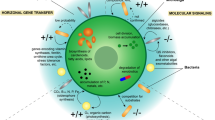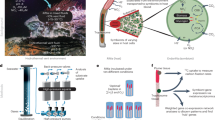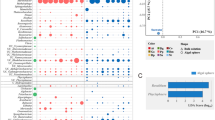Abstract
Dimethylsulfoniopropionate (DMSP) and dimethyl sulfide (DMS) are critical molecules in the global sulfur cycle and in climate regulation. Bacterial DMSP-dependent DMS production is an important natural source of DMS. The aim of the present work was to use RNA-seq technology to investigate the changes in gene expression profiles of Antarctic Rhodococcus sp. NJ-530 in response to DMSP, and the possible mechanism of DMSP metabolism. In this study, Rhodococcus sp. NJ-530 cells were exposed to 0 (control) and 1 mM DMSP for 9 h. The results showed that DMSP induces transcriptional changes to Rhodococcus sp. NJ-530. DMSP caused upregulation of several genes that may play a potential role in DMSP metabolization. Additionally, transcriptome analysis of DMSP metabolism determinized a total of 1159 differentially expressed genes (DEGs) between two treatment strategies. qRT-PCR was performed to further confirm the changes in these results. GO and KEGG enrichment analyses showed that DMS production is the result of the coordinated action of a multitude of DMSP lysis-associated genes along a pathway, including absorption mechanism, secondary metabolisms, and cellular signaling. In conclusion, our data indicated that DMSP exposure induced DMSP cleavage pathway activity, and the effects on the gene expression profile of strain NJ-530 were analyzed at the transcriptional level during the degradation of DMSP. This work provided insight into the transcriptional characterization of Rhodococcus sp. NJ-530 in response to DMSP and contributed to clarifying the biodegradation and underlying mechanism of DMSP in Rhodococcus sp. NJ-530.







Similar content being viewed by others
Data availability
The datasets generated during and/or analyzed during the current study are available from the corresponding author on reasonable request.
References
Ainouche M, Chelaifa H, Ferreira J, Bellot S, Ainouche A, Salmon A (2012) Erratum from—polyploid evolution in spartina: dealing with highly redundant hybrid genomes. Springer, Berlin, pp 225–243
Alcolombri U, Laurino P, Lara-Astiaso P, Vardi A, Tawfik DS (2014) DddD is a CoA-transferase/lyase producing dimethyl sulfide in the marine environment. Biochemistry 53(34):5473–5475. https://doi.org/10.1021/bi500853s
Alcolombri U, Ben-Dor S, Feldmesser E, Levin Y, Tawfik DS, Vardi A (2015) Identification of the algal dimethyl sulfide-releasing enzyme: a missing link in the marine sulfur cycle. Science 348(6242):1466–1469. https://doi.org/10.1126/science.aab1586
Andrew RJ, Curson Ji, Liu A, Bermejo Martínez Robert T, Green Yohan, Chan Ornella, Carrión Beth T, Williams Sheng-Hui, Zhang GP, Yang Philip C, Bulman Page Xiao-Hua, Zhang Jonathan D (2017) Dimethylsulfoniopropionate biosynthesis in marine bacteria and identification of the key gene in this process. Nat Microbiol 2(5):17009–17009. https://doi.org/10.1038/nmicrobiol.2017.9
Bacic MK, Yoch DC (1998) In vivo characterization of dimethysulfoniopropionate lyase in the fungus Fusarium lateritium. Appl Environ Microb 64(1):106–111. https://doi.org/10.1128/AEM.64.1.106-111.1998
Barak-Gavish N, Frada MJ, Ku C, Lee PA, Ditullio GR, Malitsky S, Aharoni A, Green SJ, Rotkopf R, Kartvelishvily E, Sheyn U, Schatz D, Vardi A (2018) Bacterial virulence against an oceanic bloom-forming phytoplankter is mediated by algal DMSP. Sci Adv 4(10):5716–5727. https://doi.org/10.1126/sciadv.aau5716
Benedicto CF, Carlos P, Jesus S (2015) Schizophrenia gene expression profile reverted to normal levels by antipsychotics. Int J Neuropsychopharmacol 18(4):066–072. https://doi.org/10.1093/ijnp/pyu066
Bullock HA, Carlos P, Jesus WB (2017) Evolution of dimethylsulfoniopropionate metabolism in marine phytoplankton and bacteria. Front Microbiol 18:637–653. https://doi.org/10.3389/fmicb.2017.00637
Burdett HL, Hatton AD, Kamenos NA (2016) Coralline algae as a globally significant pool of marine dimethylated sulfur. Glob Biogeochem Cy 29:1845–1853. https://doi.org/10.1002/2015GB005274
Chen SF, Zhou YQ, Chen YR, Gu J (2018) Fastp: an ultra-fast all-in-one FASTQ preprocessor. Bioinformatics 34:i884–i890. https://doi.org/10.1093/bioinformatics/bty560
Curson ARJ, Sullivan MJ, Todd JD, Johnston AWB (2009) Identification of genes for dimethyl sulfide production in bacteria in the gut of Atlantic Herring (Clupea harengus). ISME J 4:144–146. https://doi.org/10.1038/ismej.2009.93
Curson ARJ, Rogers R, Todd JD, Brearley CA, Johnston AWB (2010) Molecular genetic analysis of a dimethylsulfoniopropionate lyase that liberates the climate-changing gas dimethylsulfide in several marine alpha-proteobacteria and Rhodobacter sphaeroides. Environ Microbiol 10:757–767. https://doi.org/10.1111/j.1462-2920.2007.01499.x
Curson ARJ, Todd JD, Sullivan MJ, Johnston AWB (2011a) Catabolism of dimethylsulphoniopropionate: microorganisms, enzymes and genes. Nat Rev Microbiol 9:849–859. https://doi.org/10.1038/nrmicro2653
Curson ARJ, Sullivan MJ, Todd JD, Johnston AWB (2011b) DddY a periplasmic dimethylsulfoniopropionate lyase found in taxonomically diverse species of proteobacteria. ISME J 15(7):1191–1200. https://doi.org/10.1038/ismej.2010.203
Curson ARJ, Fowler EK, Dickens S, Johnston AWB, Todd JD (2012) Multiple DMSP lyases in the γ-proteobacterium Oceanimonas doudoroffii. Biogeochemistry 110:109–119. https://doi.org/10.1007/s10533-011-9663-2
Fowler EK (2015) On the molecular diversity of dimethylsulphoniopropionate catabolism by marine bacteria. Dissertation, University of East Anglia
González JM, Kiene RP, Moran MA (1999) Transformation of sulfur compounds by an abundant lineage of marine bacteria in the alpha-subclass of the class proteobacteria. Appl Environ Microbiol 65(9):3810–3819. https://doi.org/10.1128/AEM.65.9.3810-3819.1999
Gröne T, Kirst GO (1991) Aspects of dimethylsulfoniopropionate effects on enzymes isolated from the marine phytoplankter Tetraselmis subcordiformis. J Plant Physiol 138(1):85–91. https://doi.org/10.1016/S0176-1617(11)80735-2
Halifu S, Deng X, Song XS, Song RQ, Liang X (2020) Inhibitory mechanism of Trichoderma virens ZT05 on Rhizoctonia solani. Plants (basel) 9:912–930. https://doi.org/10.3390/plants9070912
He YY, Qu CF, Zhang LP, Miao JL (2021) DNA photolyase from Antarctic marine bacterium Rhodococcus sp. NJ-530 can repair DNA damage caused by ultraviolet. 3 Biotech 11(2):102. https://doi.org/10.1007/s13205-021-02660-8
Husband JD, Kiene RP, Sherman TD (2012) Oxidation of dimethylsulfoniopropionate (DMSP) in response to oxidative stress in Spartina alterniflora and protection of a non-DMSP producing grass by exogenous DMSP + acrylate. Environ Exp Bot 79:44–48. https://doi.org/10.1016/j.envexpbot.2012.01.006
Johnston AWB, Todd JD, Lei S, Nikolaidou-Katsaridou MN, Curson ARJ, Rogers R (2008) Molecular diversity of bacterial production of the climate changing gas, dimethyl sulphide, a molecule that impinges on local and global symbioses. J Exp Bot 59(5):1059–1067. https://doi.org/10.1093/jxb/erm264
Kiene RP, Williams LPH, Whitman WB (1998) Seawater microorganisms have a high affinity glycine betaine uptake system which also recognizes dimethylsulfoniopropionate. Aquat Microb Ecol 15(1):39–51. https://doi.org/10.3354/ame015039
Kiene RP, Linn LJ, Bruton JA (2000) New and important roles for DMSP in marine microbial communities. J Sea Res 43:209–224. https://doi.org/10.1016/S1385-1101(00)00023-X
Kirst GO, Thiel C, Wolff H, Nothnagel J, Wanzek M, Ulmke R (1991) Dimethylsulfoniopropionate (DMSP) in ice-algae and its possible biological role. Mar Chem 35(1–4):381–388. https://doi.org/10.1016/S0304-4203(09)90030-5
Kovalchuk A, Driessen AJM (2010) Phylogenetic analysis of fungal ABC transporters. BMC Genomics 11:177. https://doi.org/10.1186/1471-2164-11-177
Ksionzek KB, Lechtenfeld OJ, McCallister SL, Schmitt-Kopplin P, Geuer JK, Geibert W, Koch BP (2016) Dissolved organic sulfur in the ocean: Biogeochemistry of a petagram inventory. Science 354(6311):456-459. https://doi.org/10.1126/science.aaf7796
Lana A, Bell TG, Simó R, Vallina SM, Ballabrera-Poy J, Kettle AJ, Dachs J, Bopp L, Saltzman ES, Stefels J, Johnson JE, Liss PS (2011) An updated climatology of surface dimethlysulfide concentrations and emission fluxes in the global ocean. Glob Biogeochem Cy 25:1004. https://doi.org/10.1029/2010GB003850
Langmead B, Salzberg SL (2012) Fast gapped-read alignment with Bowtie 2. Nat Methods 9:357–359. https://doi.org/10.1038/nmeth.1923
Lee S, Suh S, Kim S, Crain RC, Kwak JM, Nam HG, Lee Y (1997) Systemic elevation of phosphatidic acid and lyso-phospholipid levels in wounded plants. Plant J 12:547–556. https://doi.org/10.1046/j.1365-313X.1997.00547.x
Lee JSF, Poretsky RS, Cook MA, Reyes-Tomassini JJ, Berejikian BA, Goetz FW (2016) Dimethylsulfoniopropionate (DMSP) increases survival of larval sablefish, Anoplopoma fimbria. J Chem Ecol 42:533–536. https://doi.org/10.1007/s10886-016-0713-z
Li CX, Yang GF, Pan JF, Zhang HH (2010) Experimental studies on dimethylsulfide (DMS) and dimethylsulfoniopropionate (DMSP) production by four marine microalgae. Acta Oceanol Sin 29:78–87. https://doi.org/10.1007/s13131-010-0052-9
Li Y, Wang MM, Li QF, Gao YX, Li Q, Li JG, Cao YF (2020) Transcriptome profiling of longissimus lumborum in Holstein bulls and steers with different beef qualities. PLoS ONE 15(6):e0235218. https://doi.org/10.1371/journal.pone
Li CY, Wang XJ, Chen XL, Sheng Q, Zhang S, Wang P, Quareshy M, Rihtman B, Shao X, Gao C, Li F, Li S, Zhang W, Zhang XH, Yang GP, Todd JD, Chen Y, Zhang YZ (2021) A novel ATP dependent dimethylsulfoniopropionate lyase in bacteria that releases dimethyl sulfide and acryloyl-CoA. Elife 10:e64045. https://doi.org/10.7554/eLife.64045
Liu J, Liu J, Zhang SH, Liang J, Lin H, Song D, Yang GP, Todd JD, Zhang XH (2018) Novel insights into bacterial dimethylsulfoniopropionate catabolism in the East China Sea. Front Microbiol 9:3206. https://doi.org/10.3389/fmicb.2018.03206
Lyon BR, Bennett-Mintz JM, Lee PA, Janech MG, DiTullio GR (2016) Role of dimethylsulfoniopropionate as an osmoprotectant following gradual salinity shifts in the sea-ice diatom Fragilariopsis cylindrus. Environ Chem 13(2):181–194. https://doi.org/10.1071/EN14269
Qu CF, Wang WY, Dong JJ, Wang XX, Miao JL (2019) Complete genome sequence of Rhodococcus sp. NJ-530, a DMSP-degrading actinobacterium isolated from Antarctic sea ice. 3 Biotech 9:363–370. https://doi.org/10.1007/s13205-019-1889-z
Raina JB, Tapiolas DM, Forêt S, Lutz A, Abrego D, Ceh J, Seneca FO, Clode PL, Bourne DG, Willis BL, Motti CA (2013) DMSP biosynthesis by an animal and its role in coral thermal stress response. Nature 7473:677–680. https://doi.org/10.1038/nature12677
Reusch RN (1999) Polyphosphate/poly-(R)-3-hydroxybutyrate) ion channels in cell membranes. Prog Mol Subcell Biol 23:151–182. https://doi.org/10.1007/978-3-642-58444-2_8
Souza MPD, Yoch DC (1995) Purification and characterization of dimethylsulfoniopropionate lyase from an alcaligenes-like dimethyl sulfide-producing marine isolate. Appl Environ Microbiol 61:21–26. https://doi.org/10.1128/aem.61.1.21-26.1995
Stefels J (2000) Physiological aspects of the production and conversion of DMSP in marine algae and algae higher plants. J Sea Res 43:183–197. https://doi.org/10.1016/S1385-1101(00)00030-7
Strom S, Wolfe G, Holmes J, Stecher H, Shimeneck C, Sarah L (2003) Chemical defense in the microplankton I: feeding and growth rates of heterotrophic protists on the DMS-producing phytoplankter Emiliania huxleyi. Limnol Oceanogr 48(1):217–229. https://doi.org/10.4319/lo.2003.48.1.0217
Sun J, Todd JD, Thrash JC, Qian Y, Qian MC, Temperton B, Guo J, Fowler EK, Aldrich JT, Nicora CD, Lipton MS, Smith RD, De Leenheer P, Payne SH, Johnston AW, Davie-Martin CL, Halsey KH, Giovannoni SJ (2016) The abundant marine bacterium Pelagibacter simultaneously catabolizes dimethylsulfoniopropionate to the gases dimethyl sulfide and methanethiol. Nat Microbiol 1:16065–16088. https://doi.org/10.1038/nmicrobiol.2016.65
Todd JD, Rogers R, Li YG, Wexler M, Bond PL, Sun L, Curson AR, Malin G, Steinke M, Johnston AW (2007) Structural and regulatory genes required to make the gas dimethyl sulfide in bacteria. Science 315:666–669. https://doi.org/10.1126/science.1135370
Todd JD, Curson ARJ, Dupont CL, Nicholson P, Johnston AWB (2009) The dddP gene, encoding a novel enzyme that converts dimethylsulfoniopropionate into dimethyl sulfide, is widespread in ocean metagenomes and marine bacteria and also occurs in some Ascomycete fungi. Environ Microbiol 11:1376–1385. https://doi.org/10.1111/j.1462-2920.2009.01864.x
Todd JD, Curson AR, Nikolaidou-Katsaraidou N, Brearley CA, Watmough NJ, Chan Y, Page PC, Sun L, Johnston AW (2010) Molecular dissection of bacterial acrylate catabolism–unexpected links with dimethylsulfoniopropionate catabolism and dimethyl sulfide production. Environ Microbiol 12:327–343. https://doi.org/10.1111/j.1462-2920
Todd JD, Curson ARJ, Kirkwood M, Sullivan MJ, Green RT, Johnston AWB (2011) DddQ, a novel, cupin-containing, dimethylsulfoniopropionate lyase in marine roseobacters and in uncultured marine bacteria. Environ Microbiol 13:427–438. https://doi.org/10.1111/j.1462-2920.2010.02348.x
Todd JD, Kirkwood M, Newton-Payne S, Johnston AWB (2012) DddW, a third DMSP lyase in a model roseobacter marine bacterium, Ruegeria pomeroyi DSS-3. ISME J 6(1):223–226. https://doi.org/10.1038/ismej.2011.79
Trevena AJ, Jones GB (2006) Dimethylsulphide and dimethylsulphoniopropionate in Antarctic sea ice and their release during sea ice melting. Mar Chem 98:210–222. https://doi.org/10.1016/j.marchem.2005.09.005
Vallina SM, Simo R (2007) Strong relationship between DMS and the solar radiation dose over the global surface ocean. Science 315:506–508. https://doi.org/10.1126/science.1133680
Wang WY, Qu CF, Wang XX, Gao XX, Zhang HH, Miao JL (2020) Identification of a functional dddD-Rh for dimethyl sulfide production in the Antarctic Rhodococcus sp. NJ-530. J Basic Microbiol 60(7):639–648. https://doi.org/10.1002/jobm.202000032
Yoch DC (2002) Dimethylsulfoniopropionate: its sources, role in the marine food web, and biological degradation to dimethylsulfide. Appl Environ Microbiol 68:5804–5815. https://doi.org/10.1128/AEM.68.12.5804-5815.2002
Zhang XH, Liu J, Liu JL, Yang GP, Xue CX, Curson ARJ, Todd JD (2019) Biogenic production of DMSP and its degradation to DMS—their roles in the global sulfur cycle. Sci China Life Sci 62:1296–1319. https://doi.org/10.1007/s11427-018-9524-y
Zheng YF, Wang SJY, Zhou YH, Zhang J, Liu CX, Xue BT, Williams XX, Zhao L, Zhao XY, Zhu C, Sun HH, Zhang T, Xiao GP, Yang JD, Zhang XH (2020) Bacteria are important dimethylsulfoniopropionate producers in marine aphotic and high-pressure environments. Nature Communications 11(1):456–459. https://doi.org/10.1038/s41467-020-18434-4
Acknowledgements
This study was supported by the Natural Science Foundation of China (32000074), Basic Scientific Fund for National Public Research Institutes of China (2020Q02), Natural Science Foundation of China (42176130), Natural Science Foundation of Shandong (ZR2019BD023, ZR2021MD044), Tai Mountain Industry Leading Talent of Shan Dong (2019TSCYCX-06), Science and Technology Planning Project of Guangxi (AA21196002), Key Research and Development Program of Shandong Province (2021TZXD008).
Author information
Authors and Affiliations
Contributions
ZL and WX conceived, designed research, and conducted experiments/field work. ZL and WX wrote the manuscript and analyzed data. CF and WW contributed new reagents or analytical tools. QC and MJ reviewed, supervised the writing, and obtained the funding. All authors read and approved the manuscript.
Corresponding authors
Ethics declarations
Conflict of interest
There is no conflict of interest.
Additional information
Publisher's Note
Springer Nature remains neutral with regard to jurisdictional claims in published maps and institutional affiliations.
Supplementary Information
Below is the link to the electronic supplementary material.
Rights and permissions
About this article
Cite this article
Zhang, L., Wang, X., Chen, F. et al. Transcriptome analysis of Antarctic Rhodococcus sp. NJ-530 in the response to dimethylsulfoniopropionate. Polar Biol 45, 1045–1057 (2022). https://doi.org/10.1007/s00300-022-03049-w
Received:
Revised:
Accepted:
Published:
Issue Date:
DOI: https://doi.org/10.1007/s00300-022-03049-w




